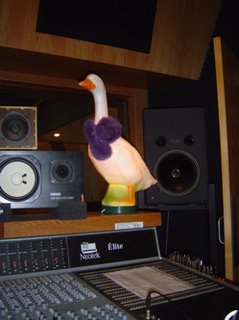COOL THOUGHTS on the STATE of the BUSINESS

The following article was brought to my attention today. It's from a really cool site that deals in 'music business advice' (click on the title of this post for the link).
How We Killed the Music Industry, and What We Can Do to Fix It
Like anyone else in the music industry, I'm often asked how music downloading managed to take over the music business, where we went wrong, and what we can do about it. I'm also often asked who's to blame for the easy access of free copyrighted music over the Internet...as I was during the writing of this editorial, when Ohio University student Kevin Lieske requested my assistance on a research project.
"Could this blame not rest upon the rapid technological advancements of our era rather than the individual's
use of this technology to obtain such an innocent and pure entity as music?" Lieske asked in the email interview.
"I don't think you can separate the two," I typed. "We all have a role in it." Then, carefully considering the potential impact of my words, I took a deep breath and wrote what until then I'd only thought, but not voiced: "We in the industry fell asleep and didn't pay attention to technology and to consumers changing buying habits."
Then I added, "But just because there's a nice house with the door wide open and a lot of nice things inside doesn't mean it's OK to go in and take them."
This editorial only concerns the music industry's half of the equation, though. So, how the hell did we end up in this mess? There are a lot of theories, and probably no definitive answer. But here's my opinion, from the perspective of working in live concert promotion and booking at the national level from the early to late 90's:
The roots of where we are now in the music industry actually go back to the first Gulf War: during the first Gulf War, many artists didn't tour because of high fuel costs and safety concerns overseas, so they didn't have the opportunity to go out and support their albums. The live touring industry never recovered from it, in terms of the number of artists on tour at any given time.
This, along with the construction of new, expensive arenas, drove ticket prices up--fewer artists on tour, but more expensive tickets to try to make up for it. So, the average fan had no access to see their favorite artist on tour--either because the artist didn't tour, or because ticket prices were no longer affordable. When you see an artist in concert, you're more likely to want to buy their CD, because the music becomes something real--more than just something in the background, or something disposable. It becomes something of value to you, because there's a strong memory attached to it. Plus, you've seen that person create those sounds right before your eyes--at that time, very few artists on tour were lip synching, and most played instruments--so you have more respect for it.
Meanwhile, alternative systems for delivering music were invented (such as new technologies for the Internet), which the industry actually welcomed at first, because we saw it as a way to bring live music to more consumers. But what happened instead was, people started spending their disposable income on computers, video games, cell phones, more expensive cable TV packages and Starbucks, all of which had taken off while the touring industry was changing. That had never happened before; even during hard economic times, music had always been one of the things people spent their disposable income on.
Now throw in the elimination of many school music programs. So now we have a whole generation of people who have never been to a concert or seen live music in any form, so they don't see the value in it. And when you don't see the value in something, you try to get it for free.
We in the industry were in denial that it would come to this, because we had access to live shows, we knew the performers, and we knew how those songs were written, how those sounds were created, and even what went into the photo sessions for the CD booklets...So the music had value to us. Most of us got into the industry because of our passion for it; like a lot of my colleagues, my first goal as a teen trying to break into the music industry was simply to subsidize my concert habit and get my next musical fix. So, it was inconceivable to us that a digital file would be an OK substitute for all that heart, soul, and passion. (I still don't like digital files; soundwise, to my ears, a lot of the mid-range and warmth are missing, and as a liner notes reader, I'm unsatisfied with anything less than a real CD booklet in my hands--and I'm not taking time out of my day to print one out.)
So, here we are. Now what do we do to fix it?
1. Invest in artist development. Give artists a chance to nurture their talent, instead of dropping them after their first album isn't "successful."
2. Redefine what a "successful" album is. Many of the artists who are still selling out shows after 20 years had albums that didn't crack the Top 50.
3. Encourage the development of good songwriting. Even in the pop genre, think classics--not disposable, unmemorable songs.
4. Don't run your artist into the ground; bring back longer album cycles so your artist doesn't burn out and has time to produce decent material.
5. Stop investing in artists that even the fans know can't really sing, play an instrument, or perform their music live.
6. Support the artists who really perform their own music live.
7. Take a young person to see a show, and give your extra comp tickets to young people so they can experience their first concert.
8. Bring back the 2000-3000 seat venue.
9. Lower ticket prices so that the average fan can afford to see live shows, and can afford to see more of them.
10. Crack down on ticket scalping, so lower ticket prices remain low.
11. Institute a fair, comprehensive blanket licensing system for the Internet, similar to that used in TV and radio, in which the Internet Service Provider (ISP) is responsible for the license fees, which are collected from the consumer in the form of a few extra dollars per month to the ISP.
12. Bring back school music programs, and as an industry, take part in those that still exist: If you're an artist, volunteer to play a show at a school. If you're an exec, work to bring your artists into schools.
Those are some off the top of my head. I'm open to suggestions. -- RR



1 Comments:
I couldn't agree with you more about supporting music programs in young people. I work for a theatre company that just had a very eye opening experience working with young people. We expected that they would learn a thing or 2 from us but lo and behold, their comments, questions, and talent actually informed our own work. What a huge surprise. I always felt like the problem between the "music industry" and the "music consumer" was the distance.
Post a Comment
<< Home